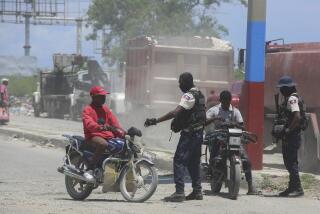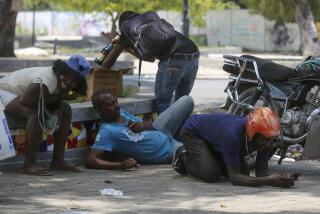U.S. Presses Haiti for Fair Probe of Killings
- Share via
WASHINGTON — Relations between the United States and Haiti haven’t been quite the same since Pastor Antoine Leroy and Jacques Florival were gunned down outside Florival’s home in a suburb of Port-au-Prince under mysterious circumstances in August.
Third World killings rarely have an impact on American politics and policy, but this was no ordinary murder case. Leroy and Florival were right-wing political opponents of Haitian President Rene Preval, a key client of the Clinton administration.
Haiti has a special place in the Clinton foreign policy pantheon; less than three years ago, President Clinton sent 20,000 U.S. troops to the Caribbean nation to restore democracy after the forced departure of a blood-soaked military junta blamed for thousands of political killings. The last thing the White House wanted was to face charges from congressional Republicans that the new U.S.-sponsored government was turning on its old enemies.
Yet months of foot-dragging by Haitian authorities in their investigation of the Leroy and Florival slayings only fed suspicions in Washington--especially in Congress--about the extent of official involvement. Eventually, U.S. officials even received allegations that senior officials in the Haitian government had secretly tried to influence the testimony of eyewitnesses to the killings.
“We have received allegations of coaching of witnesses,” said one senior U.S. official, who, like other American officials interviewed for this story, declined to be identified. The United States has not received corroborating evidence, however.
“There are differences of opinion in the U.S. government on whether it is accurate information,” the official said. “There is no smoking gun” such as wiretaps or communications intercepts by U.S. intelligence that would prove conclusively that witnesses were coached.
Yet administration officials are convinced that at least one member of Preval’s presidential security unit--which was trained and monitored by the State Department’s Diplomatic Security Service and a private American contractor--is implicated in the slayings.
What is most awkward for the United States is that Diplomatic Security agents were in Haiti working with the presidential unit at the time of the killings, State Department officials acknowledge. But none of the American agents was present at the slayings, these officials stress.
Yet the Leroy and Florival killings have raised serious questions about the adequacy of the training and monitoring that the United States has provided to Haitian security forces.
Given the explosive political mix, the administration has put intense but quiet pressure on the Preval government to conduct an honest investigation of the two killings--so quiet that some congressional Republicans charge that Clinton is trying to avoid a challenge to the success of his Haiti policy.
Clinton sent Preval a private letter, still confidential, to express his personal concerns over the killings, according to U.S. officials.
In private meetings with Preval, most recently in Barbados on May 10, Clinton has also complained about the lack of progress in the Haitian government’s investigation of the killings, according to administration officials. “It is fair to say that the U.S. has expressed concern on this case in every communication we’ve had, including the most recent communications we’ve had,” said an administration official.
In addition, the administration quietly suspended $15 million in U.S. aid to the Haitian government in March, in part because of dissatisfaction with the investigation.
Several members of the presidential security unit, including the unit’s top two officials, were suspended in the wake of the killings, but no one has been arrested or tried.
Administration officials stress that the low-key U.S. pressure on Haiti is beginning to have an impact. After months of inaction, progress in the murder investigation has been made in recent weeks, according to senior administration officials.
The Haitian government has identified its leading suspect, a member of the presidential security unit named Eddie Abrouet. An arrest warrant has been issued for Abrouet, and wanted posters for him have been put up around Haiti.
“There is substantial evidence that Abrouet did commit the homicides while he was also working as a field agent for the [presidential security unit],” acknowledged Burton Wides, a Washington legal counsel for Preval’s government. A special investigative unit established to probe high-profile killings in Haiti is also now working on the case, under the watchful eye of a State Department contractor.
Wides also stressed that the Haitian government “flatly denies the allegations that witnesses were coached by government officials.” He said that the United States has “presented no evidence whatsoever” to Haitian officials supporting any allegation of coaching.
Independent Western observers say human rights conditions in Haiti have improved sharply since U.S. troops restored President Jean-Bertrand Aristide to power in 1994, ending the military dictatorship that had seized power from him in 1991.
Yet under both Aristide and Preval, who succeeded Aristide in 1996, there have been several high-profile killings of right-wing political figures and supporters of the former military junta, raising concerns in Washington about the new Haitian government’s commitment to human rights.
But an administration official said that it is “completely unacceptable even if the number of political killings is just a couple dozen.”
Like so many other human rights cases on both the right and the left in Haiti, the Leroy and Florival killings are wrapped up in the murky political intrigue that has so often baffled Americans and other observers of Haitian affairs.
Leroy and Florival were members of a right-wing group called Mobilization for National Development, which has close ties to the former military dictatorship. Shortly before their killings, Haitian police arrested 20 people affiliated with the group to foil what Haitian officials described as an anti-government plot.
Two nights after the police raid, gunmen attacked the national police headquarters and the Parliament building, shooting wildly at both in what the government described as a right-wing attempt to destabilize Preval.
Then on Aug. 20, Leroy and Florival were shot to death, and U.S. officials said they intercepted radio messages and recovered shell casings implicating members of the presidential security unit.
“It’s fair to say that there were a number of individuals who were members of the presidential security unit who were present at the murders when they occurred,” said a senior administration official. “The degree to which they all understood what was going on is still being investigated.”
Critics in Congress wonder whether the U.S. officials who helped create the unit to protect Aristide--and later Preval--should have monitored the unit’s actions more closely.
“How can you have a small, elite unit that is receiving full-time U.S. assistance get involved in murder?” asked one senior Senate Republican aide. In addition to sending members of its Diplomatic Security force to Haiti to train Aristide’s new security force after his return to power in 1994, the State Department hired MVM Inc., a Virginia security firm, to protect Aristide and to help train the new Haitian unit. Both Diplomatic Security agents and MVM employees continued to work with the presidential security unit after Preval came to power last year.
State Department officials acknowledge that they knew from the beginning that the quality of the presidential security force was low.
Dennis Williams, an executive at MVM and former director of overseas operations for the Diplomatic Security Service, added that trainers had to teach such basic issues as “human rights, rules of law, due process. . . . These are not native, intuitive concepts in a culture that has been ruled by despots since the early 1800s.”
State Department officials also maintain that any alleged abuses occurred out of sight of the unit’s American monitors, who accompanied members of the presidential security unit only when they were on duty protecting Preval and other government officials.
More to Read
Sign up for Essential California
The most important California stories and recommendations in your inbox every morning.
You may occasionally receive promotional content from the Los Angeles Times.













